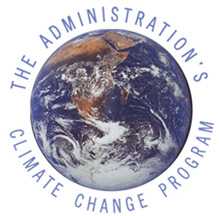 |
 |
ONGOING DOMESTIC CLIMATE CHANGE PROGRAMS
|
There are dozens of win-win climate change programs and initiatives put
into place by President Clinton since 1993. These investments aim to
develop and deploy energy efficient technologies and spur the development
and broader use of renewable energy. These efforts have accelerated and
expanded since the Kyoto climate change conference in 1997. Sustaining
this commitment to reducing U.S. greenhouse gas emissions has been a
focused effort by President Clinton to invest in the research,
development, and deployment of energy efficiency technologies and
renewable energy — an area whose budget in the U.S. Department of
Energy
(DOE) has exceeded $800 million each and every year of the Clinton
Administration.
The centerpiece of President Clintonís domestic climate change program is the Climate Change Technology Initiative (CCTI) — a package of targeted tax incentives and investments aimed at increasing energy efficiency and spurring broader use of renewable energy. The package will save consumers money and reduce greenhouse gas emissions at the same time. CCTI investments have totaled over $1 billion each of the past two years. The Presidentís FY 2001 budget proposes a still more accelerated effort. Highlights of CCTIís proposed $4.0 billion tax package (over 5 years) include:
The following survey highlights the most important U.S. climate change programs and initiatives, most of which are administered by the DOE, the U.S. Environmental Protection Agency (EPA), and/or the U.S. Department of Agriculture (USDA). Together, the programs cover the four major greenhouse gas-emitting sectors of the U.S. economy (buildings, transportation, industry, and electricity), and carbon sequestration and agriculture.
|

![]()